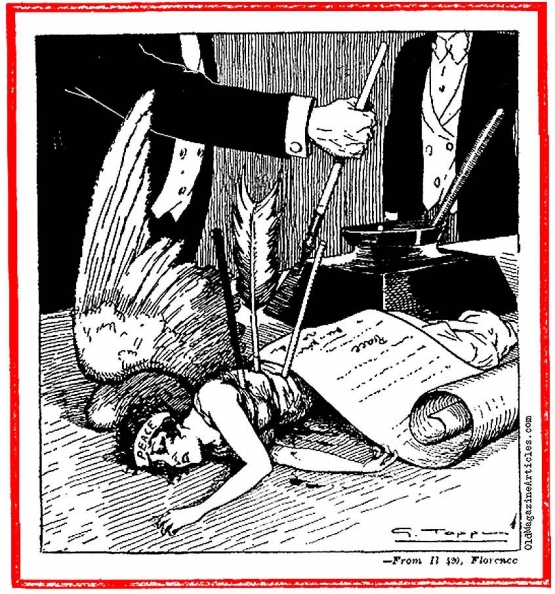World War One - Versailles Treaty
 "The war that Germany began and lost cost the Allies, according to a recent estimate, the stupendous total of $177,000,000,000. The Reparations Commission has named a principal sum of about $32,000,000,000 as the damages for which reparations by Germany is due under the Treaty of Versailles. The Supreme Council of the Allies, sitting at Paris in January, placed the amount to be paid by Germany at a present value of $21,000,000,000, which when paid with interest and in installments covering forty-two years, would amount to about $55,000,000,000." This 1923 German editorial by Professor Rudolf Euken (coincidentally published in THE EUKEN REVIEW) was accompanied by an anti-Versailles Treaty cartoon which attempted to rally the German working classes to join together in rebellion against the treaty.
"The so-called Peace of Versailles subjects the German people to unheard-of treatment; has injured and crippled Germany; has, with refined cruelty, deprived her of fertile territories; robbed her of sources indispensable to her existence; has heaped upon her huge burdens, and this for an indenite time - the intention being, if possible, to reduce her people to serfdom."
Click here to read another one of Rudolf Euken's post-war efforts.
Click here if you would like to read about the 1936 Versailles Treaty violations. "[On January 16, 1920] the Peace Conference at Paris summoned Holland to yield the ex-Kaiser of Germany for trial... In its reply, issued January 23, Holland refused."
The conferees also demanded that Germany hand over some 850 German citizens to stand trial for numerous infractions; needless to say, nothing came of the request.
"We find ourselves preparing for the next war when the ink is hardly dry on the still unratified Treaty of Peace."
These were the thoughts of the Japanese rulers who were terribly surprised to find that they had quickly become the subject of much attention by their former allies, the Americans and the Commonwealth powers following the close of the First World War. This is an interesting article that announced the Germans march into the Rhineland as well as the island of Hegoland. The journalist also listed various other Versailles Treaty infractions.
Click here to read an additional article concerning the Versailles Treaty violations. When Germany's post-war government failed to remit a portion of the 33 billion dollars it owed under it's obligations agreed to in the Versailles Treaty, France lost little time deploying her army into the coal rich regions of the Ruhr Valley. This article, illustrated with cartoons and maps, offers a collection of assorted observations and editorial opinions gathered from from across Europe concerning the event:
"Premiere Poincare remarked, 'the French troops will remain in the Ruhr as long as may be necessary to assure the payment of reparations, but not a single day longer.'"
|
MORE ARTICLES >>> PAGE: * 1 * 2 * 3 * 4 * > NEXT |
|